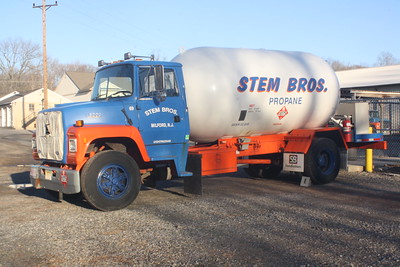
Propane gas itself is odorless, but an odorant called ethyl mercaptan is added to propane to give it a strong, distinctive odor, similar to rotten eggs or sulfur. The purpose of adding the odorant is to make it easier to detect propane leaks, which can be extremely dangerous.
When a propane tank is low, the gas pressure in the tank may drop, causing the propane to release more slowly than usual. As a result, the ethyl mercaptan odorant, which is heavier than air, may settle in the bottom of the tank and condense into a liquid. When the tank is opened or used, the reduced pressure causes the liquid odorant to evaporate, creating a strong odor of propane gas.
It’s important to note that propane odorants can also become less effective over time. If your propane tank is old or has been stored for a long period of time, the odorant may have degraded or evaporated, which can make it more difficult to detect leaks. That’s why it’s important to have your propane tank inspected and serviced regularly by a qualified professional to ensure that it is functioning properly and that the odorant is still effective.
It’s important to take propane smells seriously, regardless of whether the tank is low or not. If you smell propane, it’s important to act quickly to ensure your safety. Turn off all flames and ignition sources, leave the area immediately, and call your propane supplier or local fire department for assistance. Do not attempt to fix the problem yourself or re-enter the area until it has been deemed safe by a qualified professional.
Read this article: Ways to Get Propane Smell Off Your Hands
It’s Typical Propane Smell When the Level is Low
it is a regular occurrence to smell propane gas when the tank is low. When a tank is low, there is less gas in the tank, which can cause the pressure inside the tank to drop. This drop in pressure can cause the mercaptan to become more concentrated and more noticeable. As a result, you may notice a stronger propane odor when the tank is low.
It is important to note, however, that if you smell propane at any time in your house, you should take it seriously and take appropriate safety measures. Even if the tank is not low, a propane leak can still be dangerous and should be addressed immediately. If you smell propane, follow these safety tips:
- Evacuate the area immediately and call for help. Do not use any electronics, light switches, or other sources of ignition.
- Shut off the propane supply if it is safe to do so.
- If you are outside and cannot shut off the propane supply, move upwind of the leak to avoid inhaling the gas.
- Do not attempt to relight any appliances until the leak has been addressed and the area has been deemed safe.
- Here’s an article about How to Get Propane Out of Your House.
Remember, propane gas can be dangerous and should be treated with caution. If you have any concerns about propane safety, contact a qualified professional for assistance.
Take Safe Precautions
The smell of propane gas can be annoying and cause physical symptoms such as nausea, dizziness, and drowsiness. These symptoms may be more noticeable when the tank is low and the mercaptan odorant is more concentrated.
It is important to take any propane odor seriously and to follow proper safety precautions to avoid potential danger. In addition to the physical symptoms mentioned above, exposure to high levels of propane gas can also cause more serious symptoms such as headaches, confusion, and loss of consciousness. These symptoms can be life-threatening if not addressed promptly.
If you are experiencing any symptoms or suspect a propane leak, it is important to evacuate the area immediately and contact a qualified professional for assistance. Do not attempt to address the leak yourself, as this can be dangerous and potentially make the situation worse.
If You Shut the Tank and You Still Smell Propane, You Need to Call a Professional
if you shut off the propane tank and you still smell propane gas, it is important to call a professional immediately. This could be an indication of a propane leak somewhere in the system, which can be dangerous and potentially life-threatening if not addressed promptly.
In this situation, it is important to take proper safety precautions and evacuate the area immediately. Do not use any electronics or sources of ignition, and avoid creating any sparks or flames that could ignite the propane gas. Instead, move to a safe location and contact a qualified professional who can assess the situation and address any propane leaks.
It is important to remember that propane gas can be dangerous and should be treated with caution. Anytime you smell propane gas or suspect a leak, take it seriously and follow proper safety procedures to ensure the safety of yourself and those around you.
Importance of Regular Propane Tank Maintenance
Regular propane tank maintenance is extremely important for several reasons. Here are some key points to consider:
- Safety: Propane gas is highly flammable and can be extremely dangerous if there is a leak or other issue with the tank. Regular maintenance can help ensure that your tank is functioning properly and reduce the risk of accidents or explosions.
- Efficiency: A well-maintained propane tank will operate more efficiently, which can help you save money on fuel costs over time. By keeping your tank clean and well-maintained, you can ensure that you are getting the most out of your propane fuel.
- Longevity: Propane tanks are a significant investment, and regular maintenance can help ensure that your tank lasts as long as possible. By taking care of your tank and addressing any issues early on, you can avoid costly repairs or replacements down the line.
- Compliance: There are regulations in place governing the use and maintenance of propane tanks. By staying up-to-date on maintenance and inspections, you can ensure that your tank is compliant with these regulations and avoid any potential fines or legal issues.
So what does regular propane tank maintenance entail? Here are some key tasks that should be performed on a regular basis:
- Visual inspections to check for signs of damage or wear
- Cleaning the tank and removing any debris or dirt
- Checking the valves and fittings for leaks or other issues
- Checking the pressure and ensuring that it is within the recommended range
- Inspecting the regulator and replacing it if necessary
- Having the tank inspected by a qualified professional on a regular basis (e.g., annually)
By following these maintenance guidelines, you can help ensure that your propane tank is safe, efficient, and long-lasting. If you have any questions or concerns about propane tank maintenance, be sure to consult with a qualified professional.

Mike is an experienced propane technician with over 15 years of professional experience in the field. He has dedicated his career to helping customers with their propane needs, from installation to maintenance and repair. Together with Jeremy, he co-founded this website to provide useful information and guidance to customers seeking reliable propane services.







